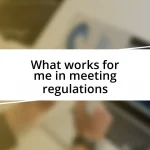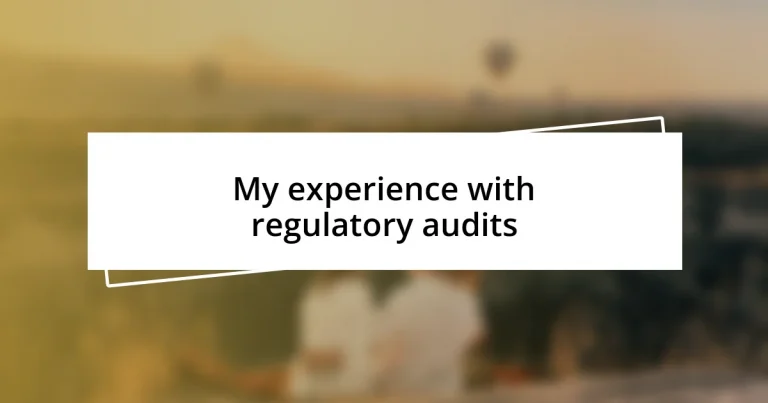Key takeaways:
- Regulatory audits are essential for ensuring compliance and fostering organizational improvement rather than just identifying mistakes.
- Preparation involves effective organization, open communication, and training to relieve stress and enhance team collaboration.
- Post-audit actions and continuous improvement, including debriefing, addressing concerns, and celebrating successes, are crucial for sustaining progress and accountability.
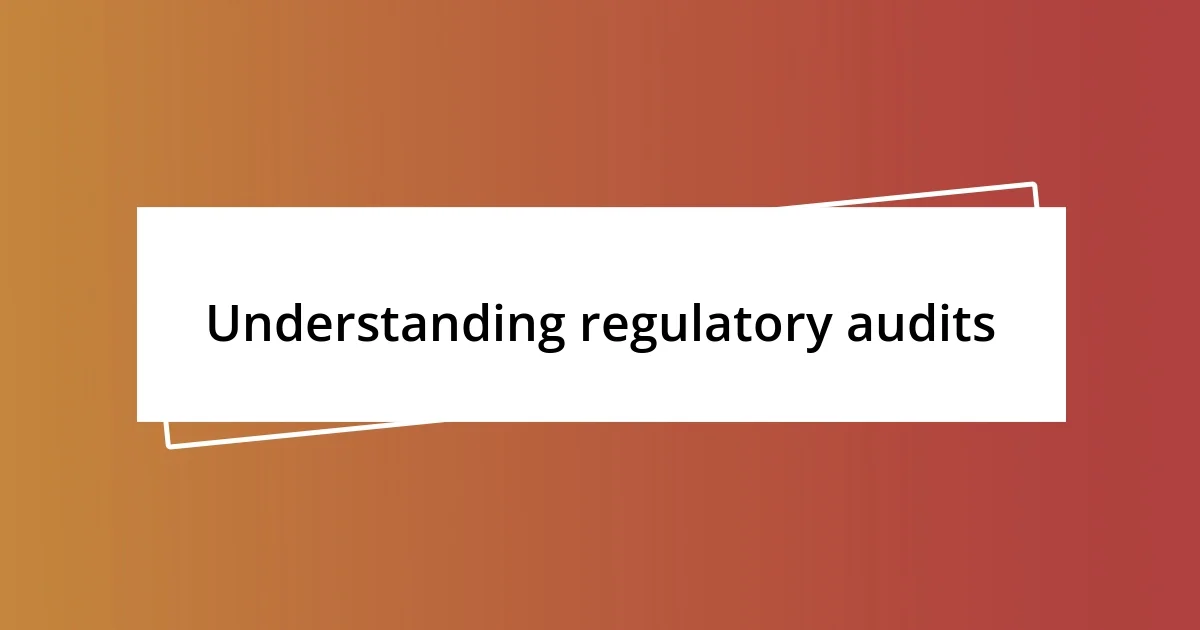
Understanding regulatory audits
Regulatory audits can feel daunting, yet they serve a critical purpose. I remember my first experience with a regulatory audit; the tension was palpable in the air. I wondered, “What if they find something wrong?” But over time, I realized these audits are designed to ensure compliance and improve practices, not merely to catch mistakes.
When I was involved in preparing for a regulatory audit, it became clear that understanding the auditors’ perspective is key. They’re not just looking at documents; they’re assessing whether our operations align with established standards. It’s almost like a health check for an organization. Have you ever had that moment when you think everything is in good shape until someone points out areas for improvement? That’s precisely what I experienced, and it became enlightening.
Moreover, regulatory audits are not just about ticking boxes; they’re opportunities for growth and learning. I recall the sense of camaraderie that developed within my team as we collaborated to address findings from our last audit. It reminded me that every challenge is a chance to strengthen our foundation and strive for excellence. Isn’t it interesting how the pressure of an audit can actually lead to enhanced teamwork and ultimately, better outcomes for everyone involved?
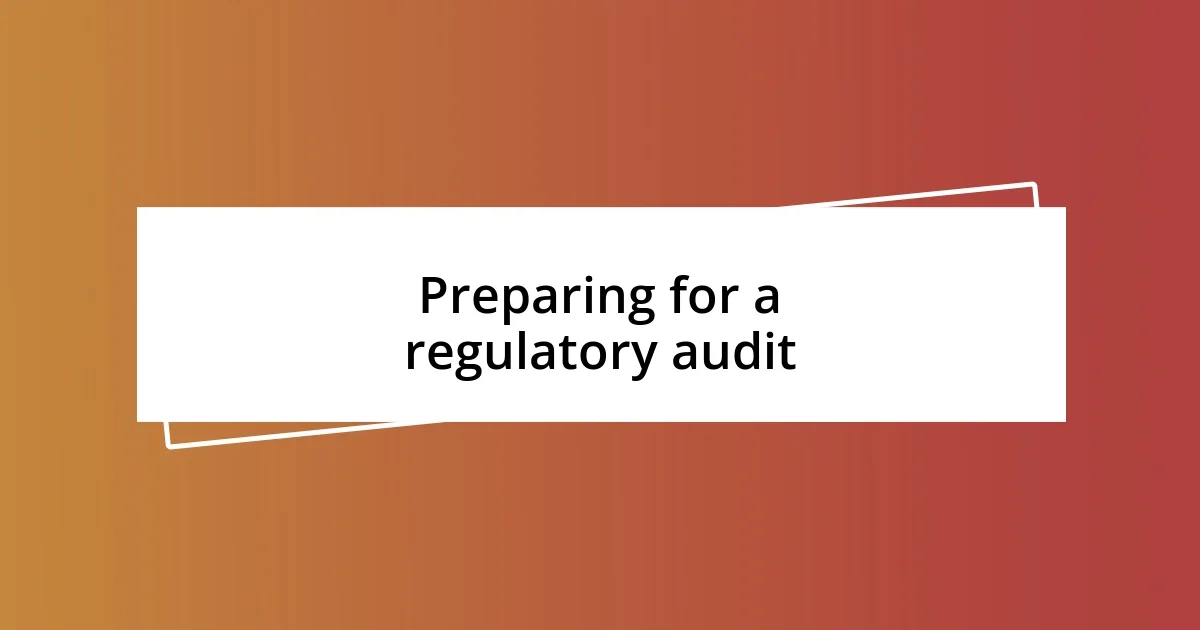
Preparing for a regulatory audit
When preparing for a regulatory audit, I learned that organization is my best ally. I recall one year when we faced an unexpected audit, and the panic set in—documents were scattered, and processes weren’t up to par. By taking a methodical approach, categorizing documents by type, and creating a timeline for each, I found clarity. The stress was manageable when I focused on what needed to be in place rather than the enormity of the task ahead. What strategies have you employed to stay organized under pressure?
Another vital aspect of preparation is communication. A few audits ago, I realized that keeping the lines open with my team made all the difference. We held regular check-ins, sharing updates on what we were collecting and bumping heads together over any gray areas. This not only ensured everyone was on the same page but also fostered an atmosphere of support and transparency. It felt liberating to tackle concerns as a united front instead of waiting until the last minute. How do you encourage open dialogue among your colleagues when gearing up for an audit?
Training and refreshers are indispensable during the preparation stages as well. I remember scheduling a workshop right before our last audit to revisit critical compliance points. It was fascinating to see team members grasp concepts they’d previously overlooked, and their newfound confidence was contagious. Engaging in such training doesn’t just build knowledge; it strengthens our commitment to compliance. Have you ever noticed a boost in morale after a well-executed training session?
| Preparation Activity | Purpose |
|---|---|
| Organizing Documents | To ensure information is readily accessible and reduce stress. |
| Communication | To foster team collaboration and transparency. |
| Training Sessions | To refresh knowledge and instill confidence in compliance practices. |
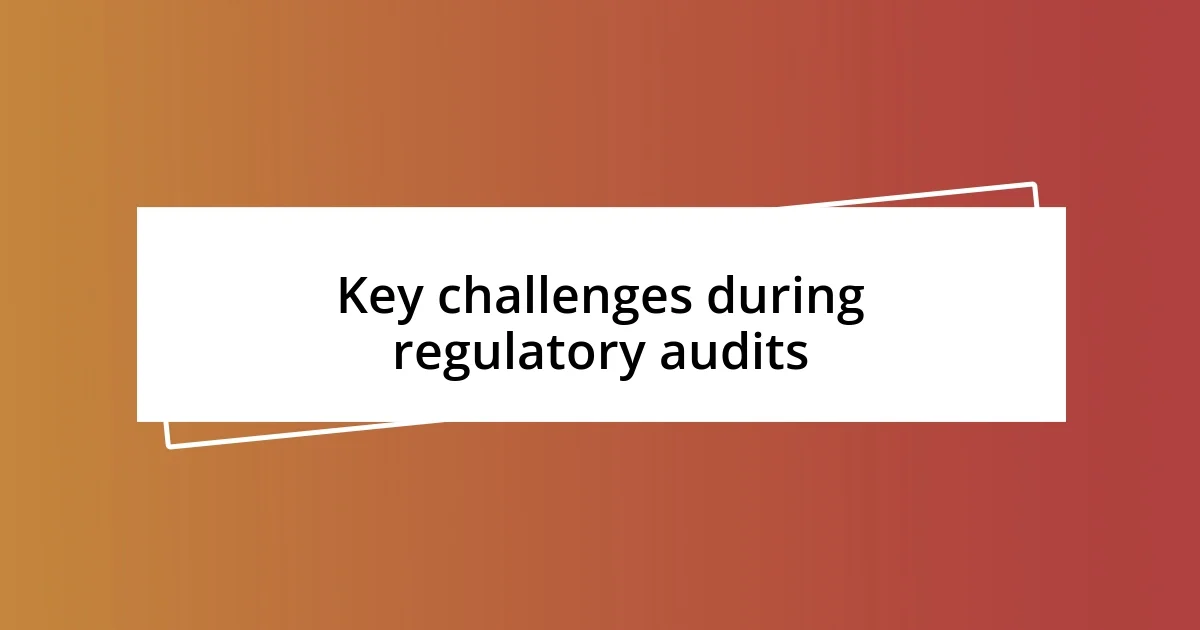
Key challenges during regulatory audits
Navigating regulatory audits isn’t just about the paperwork; it’s about dealing with pressure and maintaining morale. I vividly recall a time when we were blindsided by an unexpected audit. The atmosphere turned tense as team members exchanged worried glances, each of us grappling with fears of potential pitfalls. It was a reminder that the unpredictability of audits can weigh heavily on everyone involved. Keeping spirits high became a priority, as I encouraged my team to remain focused on solutions rather than dwelling on what could go wrong.
Key challenges during these audits often include:
- Time Constraints: We frequently encounter tight timelines that add pressure to prepare adequately.
- Inconsistent Documentation: It’s common for records to be scattered or not standardized, making it tough to present a clear picture.
- Fear of Repercussions: The anxiety around potential consequences can stifle communication and hinder thorough preparation.
- Misalignment with Standards: Sometimes, the standards set by regulatory bodies can feel ambiguous, leading to misinterpretation and confusion.
- Change Management: Implementing necessary changes post-audit is essential, yet can face resistance from team members accustomed to established processes.
Reflecting on my experience, I realized that the emotional strain of audits can be mitigated with the right mindset. One time, during a particularly grueling audit, I shared a simple yet powerful idea with my team: instead of viewing the audit as a threat, we could see it as an opportunity for improvement. Watching the team shift their perspective brought a collective sigh of relief. It became evident that addressing our fears together was a crucial step toward overcoming the challenges we faced.
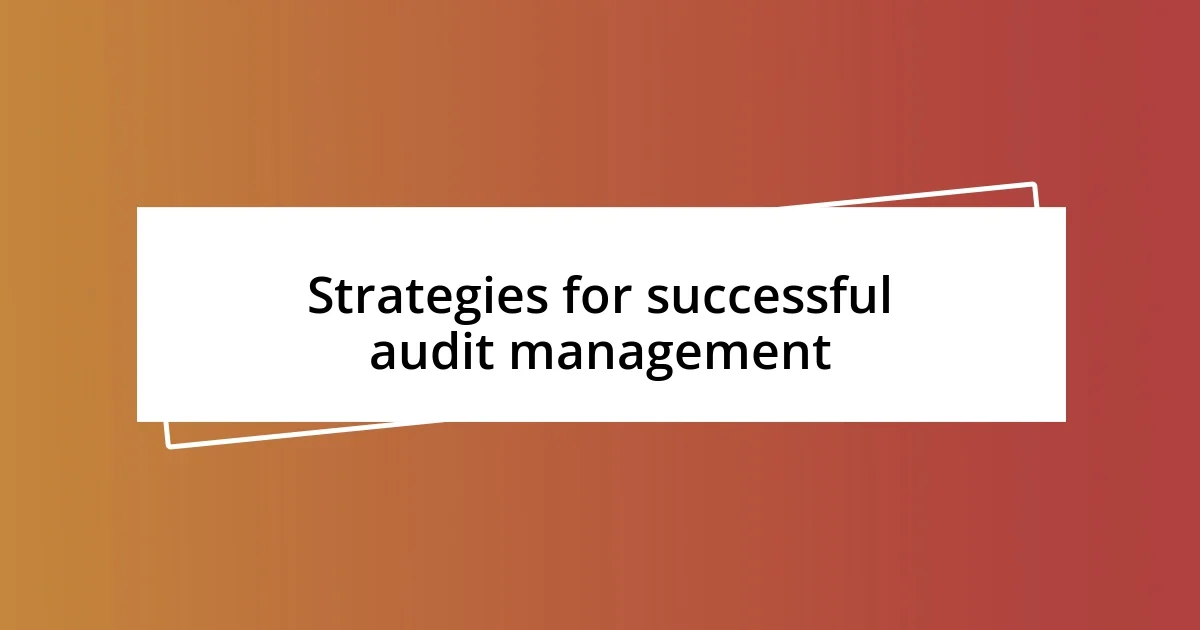
Strategies for successful audit management
Successful audit management hinges on a few key strategies that I’ve found invaluable. One of my go-to methods is to celebrate small wins along the way. During one particularly drawn-out audit process, we celebrated each document completion like a mini-victory. This not only lifted our spirits but also motivated the team to tackle the next task with renewed enthusiasm. Have you tried recognizing achievements, no matter how small, to boost morale during intense audit periods?
Another strategy involves creating a dedicated audit team well ahead of the audit date. In my experience, having a designated group focused solely on audit preparedness has proven to be a game-changer. We held brainstorming sessions to discuss potential concerns and collaboratively developed strategies to address them. This proactive approach instilled confidence within the team and ensured smoother communication. How might a focused group change your audit experience?
Finally, I’ve learned to embrace flexibility. Unexpected issues are par for the course during audits, and I recall a moment when our planned timeline went completely off track due to unforeseen regulatory queries. Instead of panicking, we recalibrated, delegated tasks based on immediate priorities, and faced the challenges head-on. Allowing some wiggle room in our plans helped us adapt without losing sight of our goals. How do you adapt when the unexpected comes knocking during an audit?
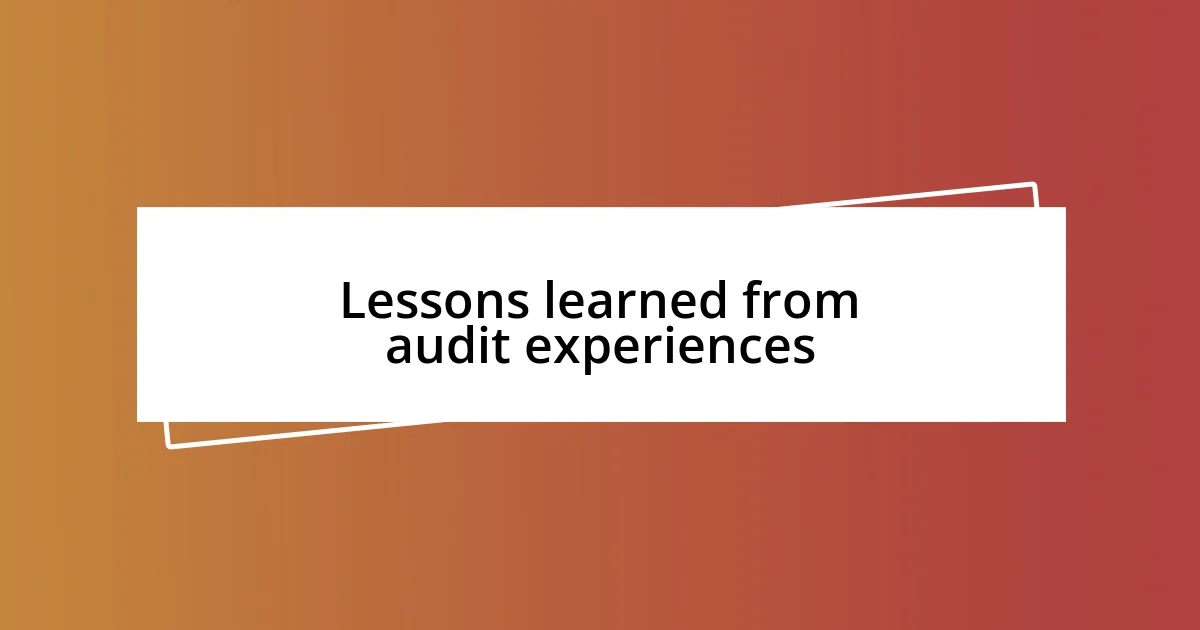
Lessons learned from audit experiences
Experiencing regulatory audits has taught me invaluable lessons about preparation and resilience. I remember one audit where my initial reaction was to panic over what seemed like an avalanche of requirements. It wasn’t until I took a deep breath and approached the situation methodically that I realized the importance of having a structured checklist. This simple tool helped streamline our focus and ensured nothing crucial was missed. Have you ever found that grounding yourself in a practical approach can transform your outlook?
One standout lesson from my audit experiences is the vital role of communication. I distinctly recall a moment when internal miscommunication nearly derailed our audit progress. By instituting regular check-ins, we created a collaborative environment where everyone felt empowered to voice concerns. This practice not only clarified our goals but also fostered a sense of camaraderie among team members. Have you thought about how open dialogues can enhance your audit readiness?
Embracing a growth mindset has also been transformative for me. After one particularly challenging audit where we faced numerous setbacks, I chose to view those challenges as stepping stones for both personal and professional development. Instead of getting discouraged, I reflected on what we could learn from the experience. This shift not only helped me handle subsequent audits with more grace but encouraged my team to embrace change positively. How do you cultivate a mindset that welcomes learning from obstacles?
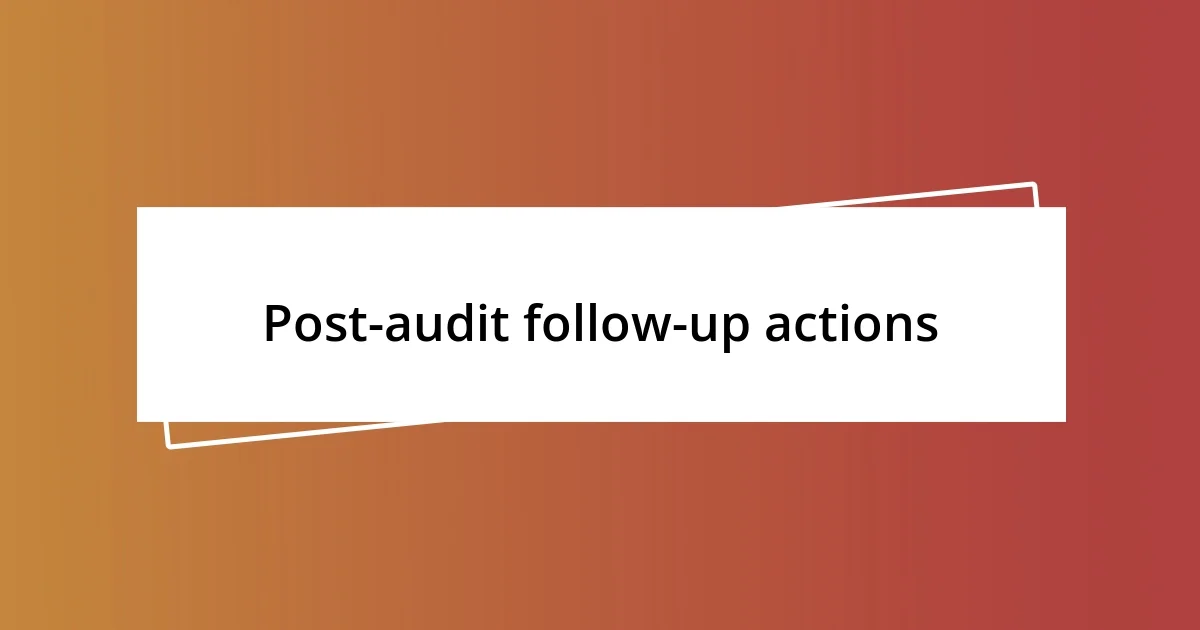
Post-audit follow-up actions
After the audit wraps up, the follow-up actions are crucial. One of the first things I do is gather the entire team for a debriefing session. This isn’t just about checking items off a list; it’s an opportunity to reflect on what went well, what didn’t, and how we can apply those lessons in the future. Have you ever noticed how a collective discussion can turn frustration into motivation?
Next, I make it a priority to address any areas of concern raised during the audit. For instance, after an audit pointed out gaps in our documentation process, I initiated a series of workshops to fortify our practices. It’s like transforming feedback into fuel for improvement. Isn’t it fascinating how a negative remark can pivot into a chance for growth?
Lastly, I ensure that there’s a clear plan in place for implementing changes. A few months ago, we discovered some compliance lapses that needed urgent attention. By assigning specific team members to tackle these tasks and establishing deadlines, we created accountability. This not only commits everyone to action but also helps rebuild trust in our systems. How do you prioritize post-audit actions to ensure lasting change?
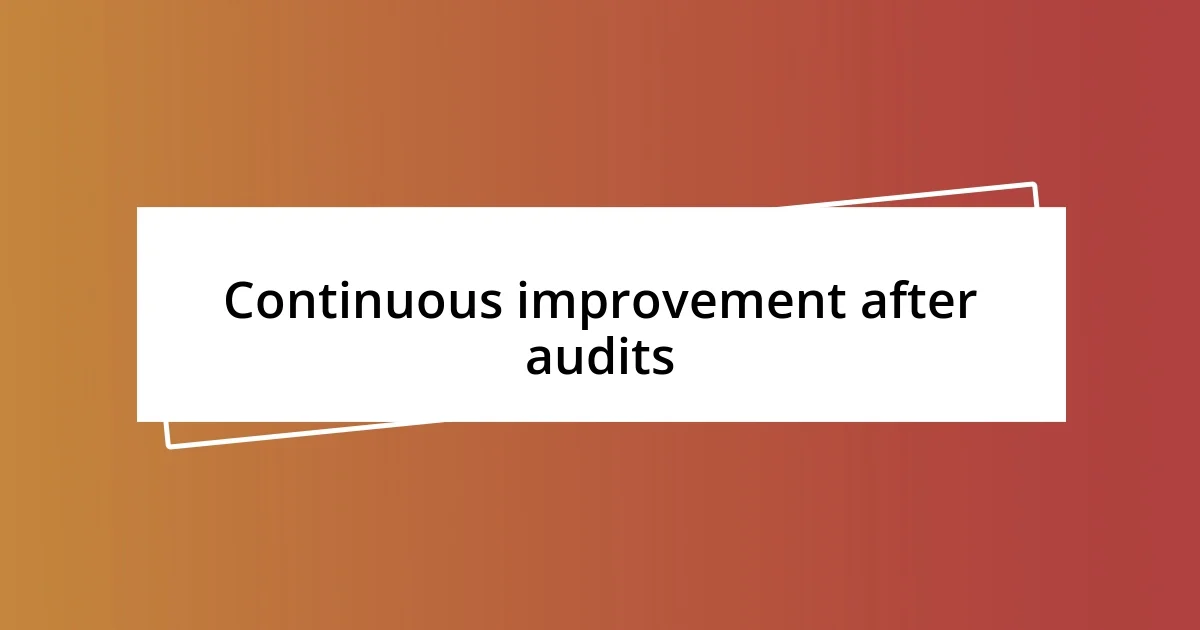
Continuous improvement after audits
Once the dust settles after an audit, I find it vital to shift the focus toward continuous improvement. I remember a particular situation where we faced a critical finding about our reporting process. Instead of brushing it off, we embraced it as a pivotal learning moment. That finding led us to implement weekly review sessions, which not only refined our reporting but also instilled a culture of accountability. Have you ever turned an audit pain point into a point of pride?
Incorporating regular feedback loops has also been a game changer. I vividly recall when my team instituted quarterly check-ins specifically to address audit feedback. This proactive approach empowered everyone to voice their thoughts, making it clear that our processes were not static. It’s amazing how such a habit not only enhances our procedures but also encourages a sense of ownership among team members. Don’t you think ongoing dialogue can lead to richer insights?
Finally, celebrating small victories after implementing improvements has proven to be incredibly motivating. I’ll always cherish that moment when we received an email confirming our enhanced compliance measures were recognized by the auditors. In sharing that success with the team, I noticed an increase in morale and a commitment to perpetual enhancement. Isn’t it rewarding to acknowledge progress and inspire others to aim for even greater heights?









